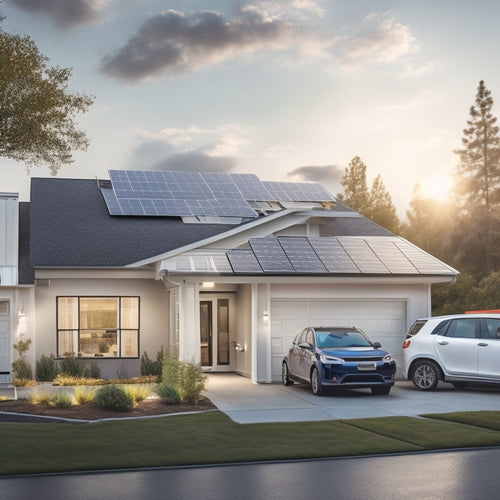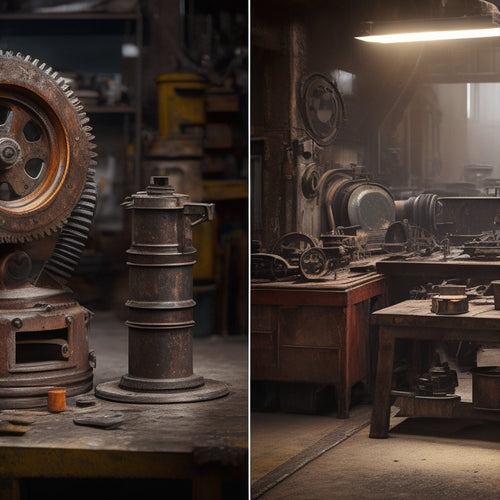
Home Renewable Energy Is the Future of Power
Share
You're already part of a global movement that's changing away from fossil fuels, with 80% of the world's energy currently coming from these finite resources, and it's only a matter of time before renewable energy systems become the new norm. Home renewable energy utilizes natural sources like wind, geothermal, hydroelectric, biomass, and solar power, offering energy independence and community engagement. With cost savings of up to 50% on energy bills, government incentives, and emerging trends in technology, it's an investment in a sustainable future. As you investigate the possibilities, you'll uncover a wealth of opportunities waiting to be tapped.
Key Takeaways
- Renewable energy systems offer energy independence, reducing reliance on fossil fuels and fostering a sustainable future.
- Homeowners can save up to 50% on energy costs with renewable investments, enhanced by government incentives and tax credits.
- Emerging trends in home energy, such as advancements in solar power and energy storage solutions, optimize energy usage and provide backup power.
- Decentralized energy production enables reduced reliance on centralized utilities, leading to cost and carbon footprint reduction.
- Smart grid integration facilitates communication between renewable systems and the grid, enhancing energy distribution and trading efficiency.
Harnessing Natural Energy Sources
At least 80% of the world's energy still comes from fossil fuels, but you can break free from this reliance on finite resources by utilizing natural energy sources.
Wind energy, for instance, can power your home through turbines that convert wind kinetic energy into electricity. Geothermal systems, which tap into the Earth's heat, can provide both heating and cooling. Hydroelectric power, captured from moving water, is another reliable option. Biomass energy, derived from organic matter, can be used for heating, cooking, and even electricity generation. Tidal energy, although still in its infancy, has the potential to provide a significant amount of power.
To maximize energy efficiency, consider incorporating passive solar design into your home's structure, using natural light and insulation to reduce energy consumption.
Microgrid technology allows you to generate, store, and manage your own energy, giving you energy independence and reducing your carbon footprint.
Benefits of Renewable Energy Systems
Your investment in renewable energy systems pays off in numerous ways. By utilizing natural energy sources, you're not only reducing your reliance on fossil fuels but also achieving energy independence. This is made possible through technology integration, which enables seamless connection to the grid.
In addition, renewable energy systems encourage community engagement, as residents come together to promote a cleaner, sustainable future. Job creation is another significant benefit, as the industry continues to grow, providing new opportunities for skilled workers.
Efficiency improvements are also a hallmark of renewable energy systems, ensuring maximum energy output with minimal waste. Additionally, these systems are scalable, allowing you to expand or modify them as your energy needs change.
While maintenance considerations are essential, they're relatively minimal compared to traditional energy systems. Moreover, policy structures are adapting to support renewable energy adoption, promoting social equity and investment opportunities.
Saving Money With Clean Power
As you reap the benefits of renewable energy systems, you're likely to notice a significant reduction in your energy expenses. This is because renewable energy sources like solar and wind power allow you to generate your own electricity, reducing your reliance on the grid and lowering your energy bills.
In fact, homeowners who invest in renewable energy systems can save up to 50% on their energy costs, depending on their energy usage and the size of their system.
One of the key factors contributing to these cost savings is energy efficiency. Renewable energy systems are designed to maximize energy production while minimizing energy waste. This means that you'll get more power from the same amount of energy, reducing your overall energy consumption and saving you money in the long run.
Additionally, many governments offer incentives and tax credits for homeowners who invest in renewable energy systems, further increasing the cost savings.
Environmental Impact of Renewables
In contrast to fossil fuels, which emit harmful greenhouse gases and pollutants, renewable energy systems harness the power of nature to generate clean electricity, greatly reducing your carbon footprint and contributing to a healthier environment.
By adopting renewable energy, you'll be supporting ecosystem preservation and environmental justice, as well as promoting sustainable agriculture practices. The air quality in your community will improve markedly, reducing the negative impact on local wildlife. Additionally, you'll be combating resource depletion and contributing to climate resilience.
Renewable energy systems cut down on pollution reduction, allowing habitats to be restored to their former glory. This means you'll be playing an essential role in preserving biodiversity and protecting endangered species.
Government Incentives for Homeowners
Governments worldwide recognize the importance of renewable energy in mitigating climate change and promoting sustainable development.
As a homeowner, you can benefit from various government incentives designed to encourage the adoption of renewable energy systems. These incentives can greatly reduce the upfront costs of installing solar panels, wind turbines, or other renewable energy systems.
You can take advantage of:
-
Tax credits: Federal and state governments offer tax credits for renewable energy installations, which can translate to considerable savings on your tax bill.
-
Rebate programs: Utility companies and local governments offer rebates for energy-efficient home installations, helping to offset the initial cost of going green.
-
Financing options: Governments and private institutions provide financing options, such as low-interest loans and grants, to support homeowners in moving to renewable energy.
These incentives demonstrate federal support and local commitment to promoting energy efficiency and reducing carbon emissions.
Emerging Trends in Home Energy
As you investigate the world of home renewable energy, you're likely to notice significant advancements in solar power technology, enabling more efficient energy harvesting and reduced costs.
You'll also uncover innovative energy storage solutions that can optimize your energy usage and provide backup power during outages.
These emerging trends are set to transform how you generate, store, and employ energy in your home.
Solar Power Advancements
Your rooftop is about to become a powerhouse, thanks to the latest solar power advancements. With solar panel innovations, you'll be capturing more energy from the sun than ever before. Photovoltaic efficiency has increased dramatically, allowing you to generate more power per hour of sunlight.
Here are just a few exciting developments:
-
Bifacial solar panels: These panels can absorb light from both the front and back sides, increasing energy output by up to 25%.
-
Perovskite solar cells: These new cells have shown higher power conversion efficiency rates than traditional silicon-based cells, potentially leading to even more efficient energy collection.
-
Smart solar panels: Integrated with advanced sensors and AI, these panels can optimize energy production in real-time, ensuring you get the most out of your solar setup.
These advancements mean you'll be able to power your home with clean, renewable energy more efficiently than ever before.
Get ready to reduce your carbon footprint and take control of your energy costs!
Energy Storage Solutions
With solar power advancements generating more energy from the sun, the next logical step is to effectively store this power for later use. You're no longer limited by the sun's availability, and that's a transformative factor.
Energy storage solutions have become an essential aspect of home renewable energy systems. You can now capture the power of the sun during the day and use it to fuel your home at night or on cloudy days.
Advances in battery technologies have made energy storage more efficient and cost-effective. You can choose from a range of options, including lithium-ion batteries, lead-acid batteries, and flow batteries. Each type has its advantages, and the right choice depends on your specific energy needs and budget.
Effective energy management is also vital to getting the most out of your energy storage system. You'll want to monitor your energy production and consumption in real-time to optimize your energy usage.
With smart energy management systems, you can do just that, ensuring that you're using your stored energy efficiently and reducing your reliance on the grid.
With the right energy storage solution, you'll be well on your way to energy independence.
A Sustainable Future Ahead
As you shift to a home powered by renewable energy, you're not only reducing your carbon footprint but also contributing to a larger movement towards clean energy sources.
You're helping to pave the way for renewable power grids that can support entire communities, and ultimately, a green tomorrow that starts with individual actions like yours.
Clean Energy Sources
Clean energy sources are revolutionizing the way we power our homes, and you're likely enthusiastic to tap into this sustainable movement.
You can now choose from a variety of clean energy sources to power your home, reducing your reliance on fossil fuels and lowering your carbon footprint.
Some of the most promising clean energy sources include:
-
Wind energy: utilizing the power of wind to generate electricity, ideal for rural areas with strong wind currents
-
Geothermal systems: leveraging the earth's natural heat to provide warmth and hot water, perfect for regions with significant geothermal activity
-
Hydropower technology: converting the energy of moving water into electricity, suitable for homes near rivers or coastal areas
Renewable Power Grids
Grid modernization is underway, and you're at the forefront of this change. As renewable energy sources become more prevalent, the traditional grid is adapting to accommodate decentralized energy production. This shift enables you to generate and manage your own power, reducing reliance on centralized utilities.
Smart grid integration is key to this advancement, allowing for seamless communication between your renewable energy systems and the grid. This advanced infrastructure enables real-time monitoring, efficient energy distribution, and optimized energy trading.
With smart grids, you'll have greater control over your energy usage and production, making it possible to sell excess energy back to the grid or store it for later use. As a result, you'll enjoy increased energy independence, reduced energy costs, and a significant decrease in your carbon footprint.
The future of power is decentralized, and you're driving this change. By embracing renewable power grids, you're leading the charge for a sustainable, reliable, and efficient energy system.
Green Tomorrow Starts
Your commitment to renewable energy is clearing the path for a sustainable future. By embracing green technology and sustainable practices, you're not only reducing your carbon footprint but also opening the door for future generations to thrive.
As you continue to invest in energy efficiency and eco-friendly solutions, you'll be reaping the benefits of renewable innovations that are changing the way we live and work.
Here are a few exciting developments to look forward to:
- Community initiatives that bring people together to promote energy conservation and reduce waste
- Smart homes that integrate seamlessly with renewable power grids, making it easy to monitor and control your energy usage
- New opportunities for businesses and individuals to develop innovative solutions that drive sustainable growth and development
Frequently Asked Questions
Can I Install Renewable Energy Systems Myself?
"Many hands make light work," and you're keen to get hands-on with DIY installation. However, consider the system complexity, cost considerations, and compliance with safety regulations and local permits before taking the leap, to guarantee a safe and successful renewable energy setup.
How Do I Choose the Right Renewable Energy System for My Home?
You'll select the ideal renewable energy system for your home by researching various system types, like solar, wind, and geothermal, and conducting a thorough cost analysis to determine which option best fits your energy needs and budget.
Are Renewable Energy Systems Compatible With Existing Electrical Grids?
As you plug into the grid, imagine a harmonious dance between your renewable energy system and the existing infrastructure. Yes, they're compatible! With advanced grid integration and energy storage solutions, you'll seamlessly feed excess energy back into the grid, maximizing your power.
Can I Sell Excess Energy Back to the Power Company?
You can sell excess energy back to the power company through net metering, enjoying benefits like reduced bills and earning energy buyback rates, which can offset your consumption costs, and even generate revenue.
Do Renewable Energy Systems Require Frequent Maintenance?
You'll be relieved to know that renewable energy systems require minimal TLC, with maintenance frequency dependent on system type and quality; proper upkeep guarantees system longevity, giving you peace of mind and a clean energy conscience.
Related Posts
-

What Electric Vehicle Owners Need for Home Energy
As an electric vehicle owner, you need to optimize your home energy system to guarantee efficient, sustainable, and c...
-

Why Higher Upfront Costs Are Worth It
You pay a premium for high-quality, energy-efficient products, but they're worth it. With durability testing ensuring...
-

What Makes a Road Bike-Friendly by Design?
As you plan and design roads, incorporating features like dedicated bike lanes, smooth surfaces, and traffic calming ...


